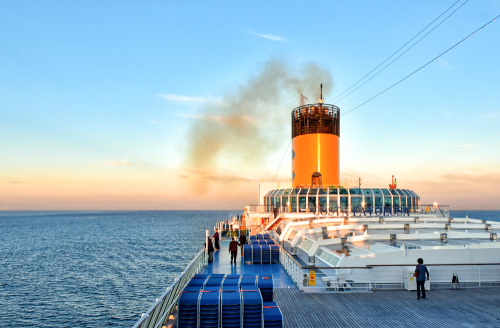The European Sea Ports Organisation (ESPO) welcomes the proposal to include shipping in an Emission Trading System (ETS).
As ESPO said, putting a price tag on shipping emissions through the EU ETS should deliver clear climate gains and push the sector to choose greener solutions.
However, the effectiveness of this policy will be undermined if evasion of a regional ETS is possible through rerouting of business
Given the international character of shipping, a global market-based measure would be, by far, the most suitable option, ESPO continues, noting that such a global measure would be more difficult to evade, and would entail lower risks for negative competitiveness effects compared to a regional measure.
For this reason, it asks the European Union to increase the pressure on IMO to make progress on the development of such a global market-based measure. An alignment between the EU ETS and a market-based measure on the international level should then follow.
Evasive port calls at neighbouring non-EU ports could seriously jeopardise the effectiveness of the maritime ETS, as it would not reduce total shipping emissions. It could even increase overall emissions, in particular when evasion leads to longer voyages
ESPO adds.
At the same time, evasive calls would divert traffic and business from European ports and seriously impact the business of certain important European ports which are already in fierce competition with other ports in countries neighbouring the EU.
For Europe’s ports the monitoring clause in the Commission proposal is “too little too late.” Instead of measuring the damage once it is already done, ESPO asks first for a full impact assessment of the implications of the current geographical scope of the proposal on carbon and business leakage, along with the accumulated impact of all Fit for 55-proposals.
European ports are supportive of an emission trading scheme and see pricing as an excellent instrument to boost greener behaviour. However, the Commission proposal contains too many loopholes that risk to seriously harm Europe’s ports business
stated Isabelle Ryckbost, ESPO Secretary General.
A possible solution according to ESPO could be to expand the scope of the proposal by considering the evasive call to/from a non-EU neighbouring port as a call to an EU port in the counting of the ETS emissions. In addition, the proposed monitoring mechanism should be strengthened to clearly define evasive trends, and foresee next steps if such trends are identified.
ESPO finally asks to reinvest any revenues generated through an ETS mechanism in the European maritime sector.
It is a matter of principle that revenues generated through a market-based measure should be used for the purpose they pursue, in this case the transition of the maritime sector to net-zero emissions
World Shipping Council (WSC) raises concerns
As WSC stated, “the European Parliament’s lead MEP on the EU ETS proposes amendments to the ETS for maritime that put the impact and efficiency of the EU Green Deal at risk.”
More specifically, WSC has two primary concerns:
- The proposed changed definition of “responsible entity” would corrupt the ETS: The proposed amendments are intended to shield shipowners from ETS costs and then provide them with front-of-line access to ETS revenues such as the Ocean Fund. This would corrupt the whole idea of the ETS, changing it from a “polluter-pays” policy to a system where the “polluter-gets-paid”, and vastly reduce its effectiveness. A market incentive for technological change that cannot be applied to shipowners who control the pace of shipboard technology innovation will fail to achieve EU Green Deal goals, slowing down the pace of transition.
- The bilateral agreements proposed would undermine progress towards global GHG policy: Other amendments direct the European Commission to abandon its principle of multilateralism and engage in bilateral deals with nations to extend carbon pricing only for routes serving Europe. This would be a costly distraction, undermining progress towards global GHG policy at the IMO and slowing progress toward decarbonising shipping. It would also undermine the GHG and economic goals of the EU Green Deal, amplifying the risks identified in EU impact assessments – GHG leakage, loss of EU port competitiveness, and distortion of trade.
EU Maritime ETS
According to WFW London Partner Nick Walker and Senior Associate Valentina Keys, there are a number of significant changes to the definitions, scope, phase-in periods and thresholds which are being proposed in the draft report:
- Full reporting on emissions to commence in 2025;
- 100% of non-EU emissions from ships calling at EU ports to be caught if IMO fails to introduce a similar global measure by 2028;
- ‘Time charterers’ now expressly included in the definition of ‘Shipping Company’;
- ETS responsibility and payment of final price to fall on the commercial operator who may not always be the Shipping Company;
- ‘Operation of the ship’ is now also expressly defined for the purposes of the contractual allocation clause;
- Establishment of an ‘Ocean Fund’ is recommended to fund R&D into maritime decarbonisation, cleaner fuels, short-sea shipping and cleaner ports.






























































